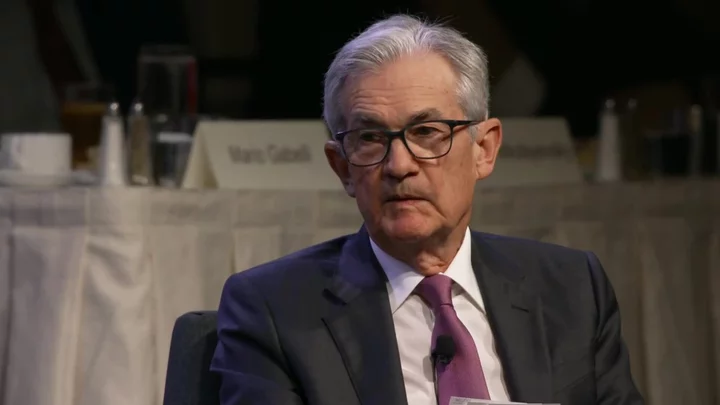Equities fell as investors responded to the threat of a weekend escalation in the Middle East conflict, driving oil and gold higher. Treasuries rose as yields at multi-year highs drew buyers.
Europe’s Stoxx 600 Index slumped 1% and US equity futures declined. Asian stocks headed for their biggest weekly drop in two months. Treasuries rose, led by gains in 10-year debt, after Federal Reserve Chairman Powell suggested the US central bank is inclined to hold interest rates steady again at its next meeting, while it watches key growth data. The dollar edged higher.
Oil traded above $90 a barrel and gold approached $2,000 an ounce after the Pentagon reported stepped-up drone attacks in Iraq and Syria, while an American destroyer intercepted cruise missiles fired toward Israel by Houthi rebels in Yemen. In addition, Israel is expected to launch a ground invasion of Gaza after massing troops on the border.
“The risk premium in crude has shot up again,” said Vandana Hari, founder of consultancy Vanda Insights. “As long as the Israel-Hamas tensions run high, crude will remain susceptible to further spikes on signs of an escalation.”
Elsewhere, China’s record injection of extra cash may offer support after the nation’s stocks erased all gains seen during their massive reopening rally that took off late last year. The economy has been challenged this year by a lack of demand and a downturn in the property market.
Still, Morgan Stanley advises against buying the dip in Chinese equities as market sentiment is likely to stay fragile while foreign fund outflow could persist near-term. Meanwhile, concerns around property sector lingered on with Country Garden Holdings Co. missing a dollar bond interest payment.
READ: China’s Country Garden Default Is All But Official, Restructuring Looms
Gains in Treasuries came ahead of more speeches from Federal Reserve officials after Powell said the Fed will proceed carefully with rate hikes, while citing evidence that policy isn’t “too tight.” Swaps trimmed the implied odds of another Fed rate increase to under 50%, and priced a start to cuts in July, compared with September previously.
Meanwhile, currency markets remain on tenterhooks as Japan’s finance minister Shunichi Suzuki said it was important the yen moved stably and in line with fundamentals, just as the currency approached 150 per dollar. Traders also monitored for unscheduled Bank of Japan bond buying operations as the 10-year yield neared 0.85%. Earlier, markets largely shrugged off Japan’s inflation that slid below 3% for the first time in more than a year.
Key events this week:
- Philadelphia Fed President Patrick Harker speaks, Friday
Some of the main moves in markets:
Stocks
- The Stoxx Europe 600 fell 1% as of 8:10 a.m. London time
- S&P 500 futures fell 0.4%
- Nasdaq 100 futures fell 0.5%
- Futures on the Dow Jones Industrial Average fell 0.3%
- The MSCI Asia Pacific Index fell 0.6%
- The MSCI Emerging Markets Index fell 0.5%
Currencies
- The Bloomberg Dollar Spot Index rose 0.1%
- The euro was little changed at $1.0575
- The Japanese yen was little changed at 149.92 per dollar
- The offshore yuan was little changed at 7.3345 per dollar
- The British pound fell 0.3% to $1.2111
Cryptocurrencies
- Bitcoin rose 2.1% to $29,317.65
- Ether rose 1.2% to $1,585.6
Bonds
- The yield on 10-year Treasuries declined five basis points to 4.93%
- Germany’s 10-year yield declined one basis point to 2.92%
- Britain’s 10-year yield was little changed at 4.67%
Commodities
- Brent crude rose 0.7% to $93.06 a barrel
- Spot gold rose 0.2% to $1,979.33 an ounce
This story was produced with the assistance of Bloomberg Automation.
--With assistance from Yongchang Chin and Matthew Burgess.









